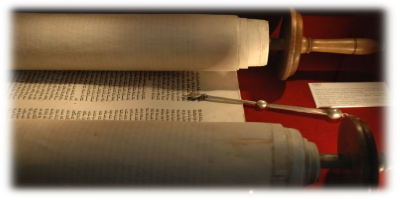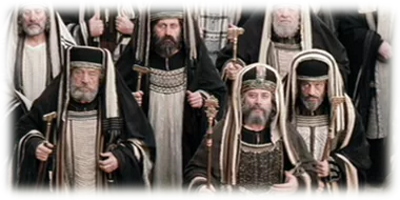Master, which is the great commandment in the law?" This question is posed by a Pharisee to Yeshua. Before we can understand Yeshua's answer, we must first understand the question correctly.
The teachings of Yeshua known to us today are in Greek. Regardless of whether or not Yeshua knew or even used the Greek language, the question is what language did Yeshua and his Jewish brothers use when teaching Torah? We know that Hebrew was used during the time of Yeshua and even to this day in religious setting, and we know that the Torah was originally written in Hebrew. It is then safe to assume that when Yeshua was teaching the Torah, he used the Hebrew language.
Here we are going to examine the Greek words of Matthew 22:36 and translate them into Hebrew. We can then translate the Hebrew into English in order to understand the text from a Hebraic perspective. There are two methods for finding Hebrew equivalents to Greek. The first is simple word similarities where both Greek and Hebrew have words that mean the same thing. The second is through a study of the Septuagint, the ancient Greek translation of the Hebrew Bible. When we find a Greek word consistently used to translate a Hebrew word, we then know that that Greek word is its equivalent. Below is the Greek text of this verse and the King James Translation. We will then look at each word in the King James translation looking at the meaning of the Greek word behind it and the Hebrew equivalent for that Greek word.
Διδασκαλε ποια εντολη μεγαλη εν τω νομω
Master, which is the great commandment in the law?
Master (G: 1320)
The Greek word "didaskolos" means "teacher" and is the equivalent to the Hebrew word "moreh".
which (G: 4169)
The Greek word here is "poios" and is usually translated as "what". This word is equivalent to the Hebrew word "mah".
Is The
These two words are added in the English text and are not present in the Greek. As the Greek language does use words meaning "is" and "the" frequently but not used here suggests that this sentence was written with Semitic syntax.
Great (G: 3173)
The Greek word here is megas (as in mega meaning big or large) and is equivalent to the Hebrew word "gadolah".
Commandment (G: 1785)
The Greek "entole" is equivelant to the Hebrew word "mitsvah".
In the
The Greek phrase "en to" is the equivalent to the Hebrew prefix "ba" meaning "in the."
Law (G: 3551)
The Greek word "nomos" is equivalent to "torah".
Now that we know the Hebrew equivalents to the Greek text, we can translate it into Hebrew as follows.
מורה מה מצוה גדולה בתורה
Let us now translate "moreh mah mitsvah gadolah batorah" into English.
Moreh (H: 3384)
This word means "teacher".
Mah (H: 4100)
This word means "what".
Mitsvah (H: 4687)
While this word is often translated as "command" or "commandment" it also means "precept" - "A rule or principle prescribing a particular course of action or conduct". This Webster's definition of "precept" perfectly describes the function of the mitsvot (plural for mitsvah) found in the Torah. The Hebrew word "mitsvah" would be better translated as "precept" than command as the word "command" - "To have control or authority over; rule: a general who commands an army." The mitsvot of the Torah are about lifestyle, culture and attitude of the one performing the mitsvot, not the control of the one who gave the mitsvot.
Gadolah (H: 1419)
This word means "great".
Ba
This prefix means "in the" or "within the".
Torah (H: 8451)
While this word is frequently translated as "law" it means "teachings". Notice that this sentence begins with "moreh" meaning "teacher" and ends with "torah" meaning "teachings. Both English words clearly come from the same root "teach", but the two Hebrew words also come from the same root "yarah".
The Greek and English translation of this verse implies that the speaker is asking for one command found in the Torah that is above all the others but, when we translate the Hebrew sentence into English, we find a slightly different question.
Teacher, what is the great precept within Torah?
The question posed to Yeshua is "what is the summary of all of Torah"? Let us now look at the following verses, from a Hebraic perspective using the same methods as used above.
"Teacher, what is the great precept within Torah?" Yeshua said to him, "'You shall love YHWH your God with all your heart and with all your being and with all your belongings', this is the beginning and great precept, and another like it is 'You shall love your companions as yourself'. Within these two precepts hang all of the Tanach (Old Testament)".

Like what you’re discovering? Continue the journey from Bible reader to translator.
|






